-
01-01-2015
Research in nursing and new pathways based on SENPE
Revista Brasileira de Enfermagem. 2015;68(4):571-572
Abstract
Research in nursing and new pathways based on SENPE
Revista Brasileira de Enfermagem. 2015;68(4):571-572
DOI 10.1590/0034-7167.2015680401i
Views1Almost half a century after the beginning of nursing research in Brazil, there is still a need for investment before it can be considered consolidated. The truth of this statement can be seen in the national seminars that discuss research in the field through 17 events that present results and participation of nursing researchers and […]See more -
01-01-2015
Comprehensive health care: dilemmas and challenges in nursing
Revista Brasileira de Enfermagem. 2015;68(2):333-338
Abstract
Comprehensive health care: dilemmas and challenges in nursing
Revista Brasileira de Enfermagem. 2015;68(2):333-338
DOI 10.1590/0034-7167.2015680221i
Views0See moreABSTRACT
Objective:
this article discusses comprehensive care as a guiding tenet of the Brazilian Unifi ed Health System (SUS), outlining health care practices, especially nursing, and the relationships built by subjects in action by means of different knowledge.
Methods:
this is a theoretical refl ection that aims to propose dimensions of analysis (access to services, reception, links, lines of care, accountability, and responsiveness), with an emphasis on the dilemmas and challenges of nursing. The proposed dimensions analyze the production of care and its political and technical aspects.
Conclusion:
care should be the focus of all health care work, bearing in mind that intervention for technological action of each profession goes beyond the core of isolated knowledge, as is the case of nursing, which is connected to other professional practices, and can peruse other territories that operate through relational technologies, entering into the world of the needs of users and families.
-
01-01-2015
Gender and violence against women in nursing literature: a review
Revista Brasileira de Enfermagem. 2015;68(2):325-332
Abstract
Gender and violence against women in nursing literature: a review
Revista Brasileira de Enfermagem. 2015;68(2):325-332
DOI 10.1590/0034-7167.2015680220i
Views0See moreABSTRACT
Objective:
considering the potential of nursing to expand understanding on this theme, this study aims to learn what is being published on gender and violence against women in the main Brazilian nursing journals.
Method:
an integrative review of online publications between 2000 and 2012 was conducted. Of the 138 articles selected, 25 addressed gender and violence against women as social constructs.
Results:
there was a predominance of qualitative approaches (60%), empirical research (60%), academic (100%), authors who were nurses (96%), spousal violence (32%) and domestic violence (20%). Violence against women in the light of gender was associated in only 32% of the articles.
Conclusion:
there is a need for increased studies in partnership with the public health care service, and to expand discussions on the dynamics of power and resistance, which are the basis of the concept of gender.
-
01-01-2015
Nasal colonization in nursing professionals from units specialized in HIV/AIDS
Revista Brasileira de Enfermagem. 2015;68(2):320-324
Abstract
Nasal colonization in nursing professionals from units specialized in HIV/AIDS
Revista Brasileira de Enfermagem. 2015;68(2):320-324
DOI 10.1590/0034-7167.2015680119i
Views0See moreABSTRACT
Objective:
to investigate the presence of microorganisms in the nostrils of the nursing professionals of a Brazilian teaching hospital.
Method:
cross-sectional study in two inpatient units specialized in HIV/AIDS. Nasal secretion samples of nursing professionals were collected in one month. The samples were processed at the microbiology laboratory of the institution and analyzed using the Statistical Package for the Social Sciences (SPSS) software, version 19.0. Ethical aspects were abided.
Results:
from the 73 members of the nursing staff, samples of nasal secretions were collected from 61 (80.2%). Six types of microorganisms were isolated in 22 (41.0%) positive cultures. It is noteworthy that Staphylococcus aureus accounted for 22.9%, four of them oxacillin-resistant (MRSA).
Conclusion:
Staphylococcus aureus microorganism accounted for the largest prevalence in individuals of this study.
-
01-01-2015
Evaluation of nursing students about learning with clinical simulation
Revista Brasileira de Enfermagem. 2015;68(2):311-319
Abstract
Evaluation of nursing students about learning with clinical simulation
Revista Brasileira de Enfermagem. 2015;68(2):311-319
DOI 10.1590/0034-7167.2015680218i
Views0See moreABSTRACT
Objective:
to describe the contributions of clinical simulation for learning cognitive and procedural attributes through debriefi ng, from the perspective of nursing students.
Method:
descriptive exploratory study. Twenty nursing undergraduate students from a university in the interior of the state of São Paulo participated in this study. Data collection was performed at the debriefi ng stage. Student’s perceptions about the simulation, positive aspects and what they could have done differently were registered. The students’ statements were grouped according to the central themes and the framework of Bardin’s content analysis (2011) and were analyzed using descriptive statistics.
Results:
enhancement of active, critical and refl ective learning (47.5%) was identifi ed due to the closeness to reality in nursing care (20.3%), manifestation of feelings experienced during the simulation (15.3%) and composition of the scenario (15.3%).
Conclusion:
the clinical simulation followed by debriefi ng promotes the understanding of the link between action and achievements in learning.
-
01-01-2015
Risk assessment of patient falls while taking medications ordered in a teaching hospital
Revista Brasileira de Enfermagem. 2015;68(2):305-310
Abstract
Risk assessment of patient falls while taking medications ordered in a teaching hospital
Revista Brasileira de Enfermagem. 2015;68(2):305-310
DOI 10.1590/0034-7167.2015680217i
Views0See moreABSTRACT
Objective:
to stratify prescribed medication in a fall risk scale, identifying subgroups of drugs and inpatient units with higher risk of falls.
Method:
retrospective study on prescription order forms given by medical clinic, surgical clinic, and general intensive care unit. Risk factors under consideration: 1) orthostatic hypotension; 2) arterial hypotension; 3) arterial hypertension; 4) bradycardia; 5) psychomotor agitation; 6) mental confusion; 7) dizziness; 8) drowsiness/sedation; 9) reduced eyesight; 10) seizures; 11) atonia/dystonia/muscle weakness; 12) hypoglycemia; 13) urgent urination and 14) urgent defecation/diarrhea. Risk levels adopted: 0: 0 factor; I: 1-2 factors; II: 3-5 factors; III: 6-9 factors; IV: 10-14 factors.
Results:
3893 drugs were analyzed and stratifi ed in levels: 0 22.7%; I 33.5%; II 28%; III 15.1%; IV 0.7%. Levels III and IV more often refer to drugs for stomach acid disorders, 22.6%, and psycholeptics, 100%.
Conclusion:
knowing the risk factors associated with medication may help prevent and reduce falls, especially when therapeutic regimens cannot be modifi ed.
-
01-01-2015
Knowledge and practice of the nurse about leprosy: actions of control and elimination
Revista Brasileira de Enfermagem. 2015;68(2):297-304
Abstract
Knowledge and practice of the nurse about leprosy: actions of control and elimination
Revista Brasileira de Enfermagem. 2015;68(2):297-304
DOI 10.1590/0034-7167.2015680216i
Views0See moreABSTRACT
Objective:
to assess the knowledge and practice of primary health care nurses about control and elimination actions of leprosy.
Method:
evaluation study with qualitative approach, using the Discourse of the Collective Subject, data were collected through semi-structured interviews conducted with 16 nurses.
Results:
the data collected revealed that health professionals have suffi cient knowledge about the National Policy on Control and Elimination of Leprosy (NPCEL) and that the main actions preconized were applied, however, notifi cation of suspected or confi rmed cases and social reintegration of the patient were not mentioned.
Conclusion:
keeping patients in treatment, overload of work, lack of interdisciplinarity and treatment performed at other locations outside of the community were diffi culties reported by professionals. Nurses know the actions addressed at assistance of leprosy patients, however, the study points to the need for a practice which is more aligned to what advocates NPCEL.
-
01-01-2015
Weaknesses of vaccine storage in Primary Healthcare Centers
Revista Brasileira de Enfermagem. 2015;68(2):291-296
Abstract
Weaknesses of vaccine storage in Primary Healthcare Centers
Revista Brasileira de Enfermagem. 2015;68(2):291-296
DOI 10.1590/0034-7167.2015680215i
Views0See moreABSTRACT
Objective:
assessment through qualitative approach of vaccine storage in Primary Healthcare Centers.
Method:
assessment study of qualitative approach in which 30 interviews were conducted with nurses, nursing technicians or assistants and technical reference in immunization, in 12 vaccine rooms that had 100% of the structural criteria evaluated. Recorded testimonials of the subjects were organized and analyzed using thematic Content Analysis.
Results:
the assessment pointed to absence of knowledge on the parts of nurses and nursing technicians and assistants with respect to the effects of low temperature on vaccines. Barriers were also encountered in relation to the supervision of nurses in the vaccine room activities and in relation to the knowledge needed by workers to care for preservation of vaccines.
Conclusion:
vaccine storage is inadequate and may compromise the quality of the immunobiologicals dispensed to the populace.
-
ORIGINAL ARTICLE09-26-2022
Educational technology for infants’ families to identify warning signs: a validation study
Revista Brasileira de Enfermagem. 2022;75(5):e20210964
Abstract
ORIGINAL ARTICLEEducational technology for infants’ families to identify warning signs: a validation study
Revista Brasileira de Enfermagem. 2022;75(5):e20210964
DOI 10.1590/0034-7167-2021-0964
Views0See moreABSTRACT
Objective:
To validate, with the target audience, the usability and appearance of a serialized album about the warning signs to the health of children below 2 months.
Method:
Methodological validation study with the target population of an educational material in the form of a serialized album. 11 mothers with children under 2 months of age participated. The domains evaluated were: Objectives, Organization, Writing Style, Appearance, and Motivation. Data were analyzed using descriptive and statistics, and the data agreement index was calculated.
Results:
The global data agreement index was high (0.99). Mothers had positive responses, recognizing the excellence of the material: attractive figures that were easy to understand.
Conclusion:
The validation of the serialized album provides mothers with the abilities and knowledge they need to identify warning signs in regard to the health of their children, providing them with autonomy, corresponsibility, and helping them develop better child health practices.
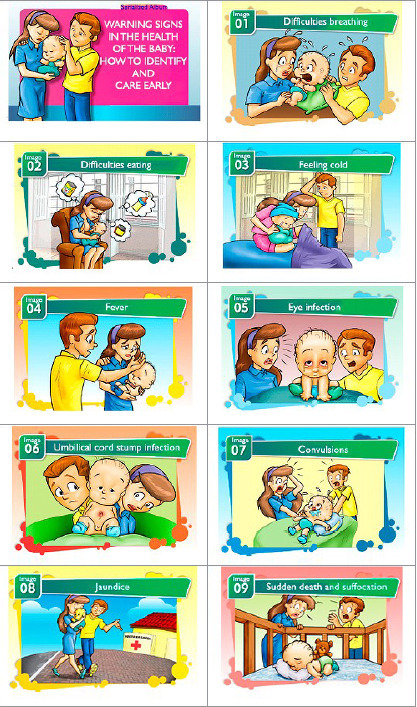
-
ORIGINAL ARTICLE10-17-2022
Validation of the Brazilian Portuguese version of the Venous International Assessment Scale and proposal of revision
Revista Brasileira de Enfermagem. 2022;75(5):e20220100
Abstract
ORIGINAL ARTICLEValidation of the Brazilian Portuguese version of the Venous International Assessment Scale and proposal of revision
Revista Brasileira de Enfermagem. 2022;75(5):e20220100
DOI 10.1590/0034-7167-2022-0100
Views0See moreABSTRACT
Objective:
To validate the Brazilian Portuguese translation and analyze the cultural adaptation of the Venous International Assessment Scale.
Methods:
Observational study by employing the Delphi technique and an equivalence evaluation by experts. The results were analyzed using item scores and by content validity index calculations of item, scale, and universal agreement.
Results:
Three rounds of evaluation were necessary for consensus. Explanatory contents were incorporated into the original scale throughout the process, resulting in a new version: VIA Scale – Revised. This scale obtained a content validity index of 0.96 and a universal agreement of 0.78. In the cross-cultural adequacy analysis phase, a score of 0.77 was obtained. The majority (90.5%) of the participants judged the scale’s decision support property as positive.
Conclusion:
The VIA Scale was validated and culturally adapted to the Brazilian Portuguese language, resulting in the VIA Scale – Revised (VIA-R).
-
ORIGINAL ARTICLE07-29-2022
Effects of guided imagery relaxation in hematopoietic stem-cell transplantation patients: a quasi-experimental study
Revista Brasileira de Enfermagem. 2022;75(5):e20220114
Abstract
ORIGINAL ARTICLEEffects of guided imagery relaxation in hematopoietic stem-cell transplantation patients: a quasi-experimental study
Revista Brasileira de Enfermagem. 2022;75(5):e20220114
DOI 10.1590/0034-7167-2022-0114
Views1See moreABSTRACT
Objective:
To analyze the effects of the technique of virtual reality guided imagery in the vital signs of hematopoietic stem-cell transplantation patients.
Method:
Quasi-experimental study with 35 participants who received an intervention using virtual reality guided imagery with progressive muscle relaxation, applied three times a week for four weeks in a referral hospital for transplants in the south of Brazil. Data collected included: temperature, arterial pressure, respiratory rate, heart rate, pain, and oxygen saturation, before and after each intervention. The comparisons were analyzed using Wilcoxon’s test.
Results:
There was a clinical significance between the mean measurements before and after for respiratory rate (p=0.00) in all stages, and for the variables Heart rate, Temperature, and Oxygen saturation from the 1st to the 12th measurements (p=0.05).
Conclusion:
The intervention was low cost, easy to apply, and showed positive effects, presenting itself as an option for patient-focused care.
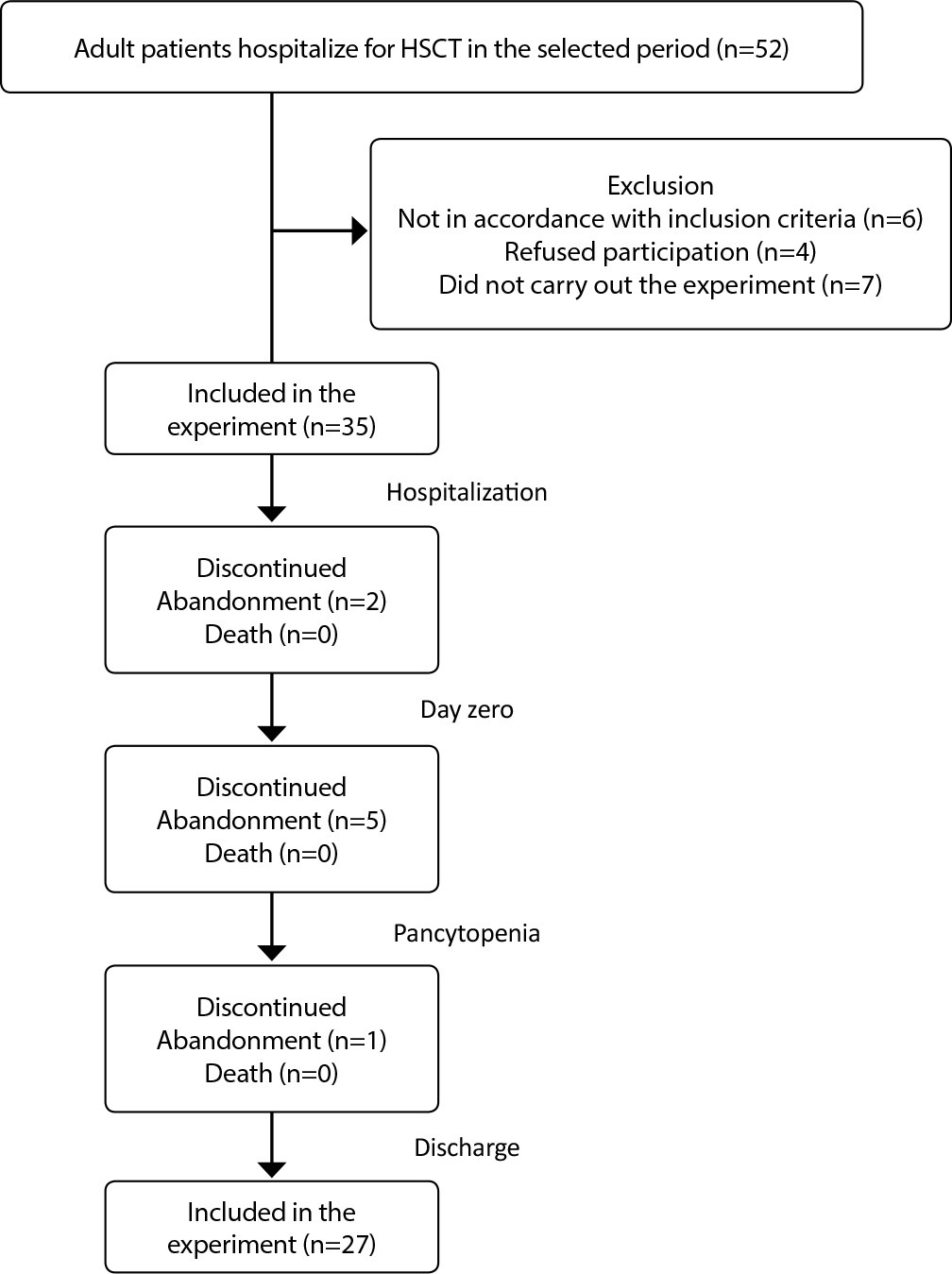
-
ORIGINAL ARTICLE10-17-2022
Semantic validation of educational technology with caregivers of children and adolescents undergoing chemotherapy
Revista Brasileira de Enfermagem. 2022;75(5):e20220294
Abstract
ORIGINAL ARTICLESemantic validation of educational technology with caregivers of children and adolescents undergoing chemotherapy
Revista Brasileira de Enfermagem. 2022;75(5):e20220294
DOI 10.1590/0034-7167-2022-0294
Views0See moreABSTRACT
Objective:
Semantically validate an educational technology with the caregiver of children and adolescents undergoing chemotherapy.
Method:
Methodological study, with a quantitative approach, guided by the theoretical framework of psychometry, developed between March and April 2022, with nine caregivers of children and adolescents undergoing chemotherapy. Educational technology is a digital animation film about the pediatric chemotherapy treatment process, used as a tool for health education.
Results:
In the reliability assessment, the Intraclass Correlation Coefficient was 0.936 [95%CI 0.868-0.984] with p < 0.05 and Cronbach’s alpha of 0.943, demonstrating satisfactory internal consistency. Regarding the semantic analysis, the domains related to objectives, organization, language, appearance, and motivation showed an agreement rate above 80%.
Conclusion:
Educational technology showed satisfactory rates, proving to be a valid, reliable, and important instrument to be used by caregivers of children and adolescents undergoing chemotherapy.
-
10-21-2022
Cancer symptom clusters: from the lab bench to clinical practice
Revista Brasileira de Enfermagem. 2022;75(5):e2022v75n5inov
Abstract
Cancer symptom clusters: from the lab bench to clinical practice
Revista Brasileira de Enfermagem. 2022;75(5):e2022v75n5inov
DOI 10.1590/0034-7167-2022v75n5inov
Views0See moreABSTRACT
Objective:
to present and discuss the advancement of science in symptom management through research involving oncological symptom clusters (OSC).
Method:
a reflective study, supported by the scientific literature on OSC.
Results:
five key points are crucial to advancing the science of symptom management through research involving OSC: definition of OSC characteristics; underlying mechanisms and priority symptom clusters; OSC measurement; targeted and personalized interventions; new analytical strategies.
Final considerations:
a better understanding of the complex connections between different systems and biobehavioral aspects in patients, especially in the field of oncology nursing, is urgent. The study of these interactions has become increasingly promising and emerging for oncology nursing, since therapeutic interventions, whose target is the neuroimmunoendocrine axis, are relevant for personalized care, translating into greater scientific and nurse autonomy to care for patients.
-
ORIGINAL ARTICLE06-24-2022
Prevalence of the Human Immunodeficiency Virus and associated factors in pregnant women in the state of Pará
Revista Brasileira de Enfermagem. 2022;75(6):e20210171
Abstract
ORIGINAL ARTICLEPrevalence of the Human Immunodeficiency Virus and associated factors in pregnant women in the state of Pará
Revista Brasileira de Enfermagem. 2022;75(6):e20210171
DOI 10.1590/0034-7167-2021-0171
Views0See moreABSTRACT
Objectives:
to analyze the prevalence of the Human Immunodeficiency Virus and the associated factors in pregnant women in the state of Pará.
Methods:
retrospective, analytical, quantitative study with a sample of 332 medical records of HIV-positive pregnant women hospitalized at the Referral Maternity Hospital in the state of Pará between 2010 and 2019. Bivariate and multivariate statistical analysis were performed with the variables collected.
Results:
the average prevalence in the period was 2.39% and the Metropolitan Region concentrated 66.87% of cases. There was a strong relationship between the number of antenatal consultations and lack of knowledge of serological status (p value equal to 0.01E-17) variables, and a correlation between the education and number of antenatal consultations variables.
Conclusions:
the increase in the infection rate during the study period revealed the need to intensify health actions, early diagnosis and strategies to improve adherence to antiretroviral treatment for maternal viral suppression and reduction of the risk of vertical transmission, contributing to improve public policies.
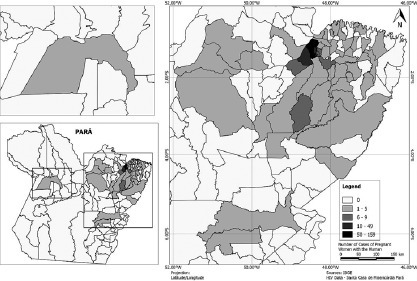
-
ORIGINAL ARTICLE10-03-2022
Evaluation of respiratory complications in a cohort of preterm infants who did not receive palivizumab monoclonal antibodies
Revista Brasileira de Enfermagem. 2022;75(6):e20210362
Abstract
ORIGINAL ARTICLEEvaluation of respiratory complications in a cohort of preterm infants who did not receive palivizumab monoclonal antibodies
Revista Brasileira de Enfermagem. 2022;75(6):e20210362
DOI 10.1590/0034-7167-2021-0362
Views0See moreABSTRACT
Objectives:
to analyze the occurrence of respiratory complications over the first year of life in preterm infants who did not receive palivizumab monoclonal antibodies.
Methods:
analytical retrospective cohort study with preterm infants born between 2012 and 2016 in Uberlândia, state of Minas Gerais, Brazil. Data collection occurred from January to November 2018, by consulting hospital and primary healthcare medical records. Data were processed with the Poisson regression model, with p<0.05.
Results:
of a total of 5,213 preterm births, 504 (9.7%) met the inclusion criteria. The preterm infants in this subset were assisted 2,899 times in primary care, which resulted in 1,098 (37.5%) medical diagnoses, of which 803 (78.5%) involved the respiratory tract. Preterm babies fed on formula milk at hospital discharge had more diagnoses of respiratory diseases. Maternal age (p=0.039), respiratory diagnosis at hospital discharge (p=0.028), and number of sporadic appointments (p<0.001) showed a significant association with bronchiolitis; number of sporadic appointments showed a significant association with occurrence of respiratory diseases; and breastfeeding had a protective effect against the development of bronchiolitis.
Conclusions:
preterm infants who did not receive palivizumab showed a high percentage of respiratory diseases, and breastfeeding helped protect them against bronchiolitis. It is recommended that these preterm babies be monitored in primary health care.
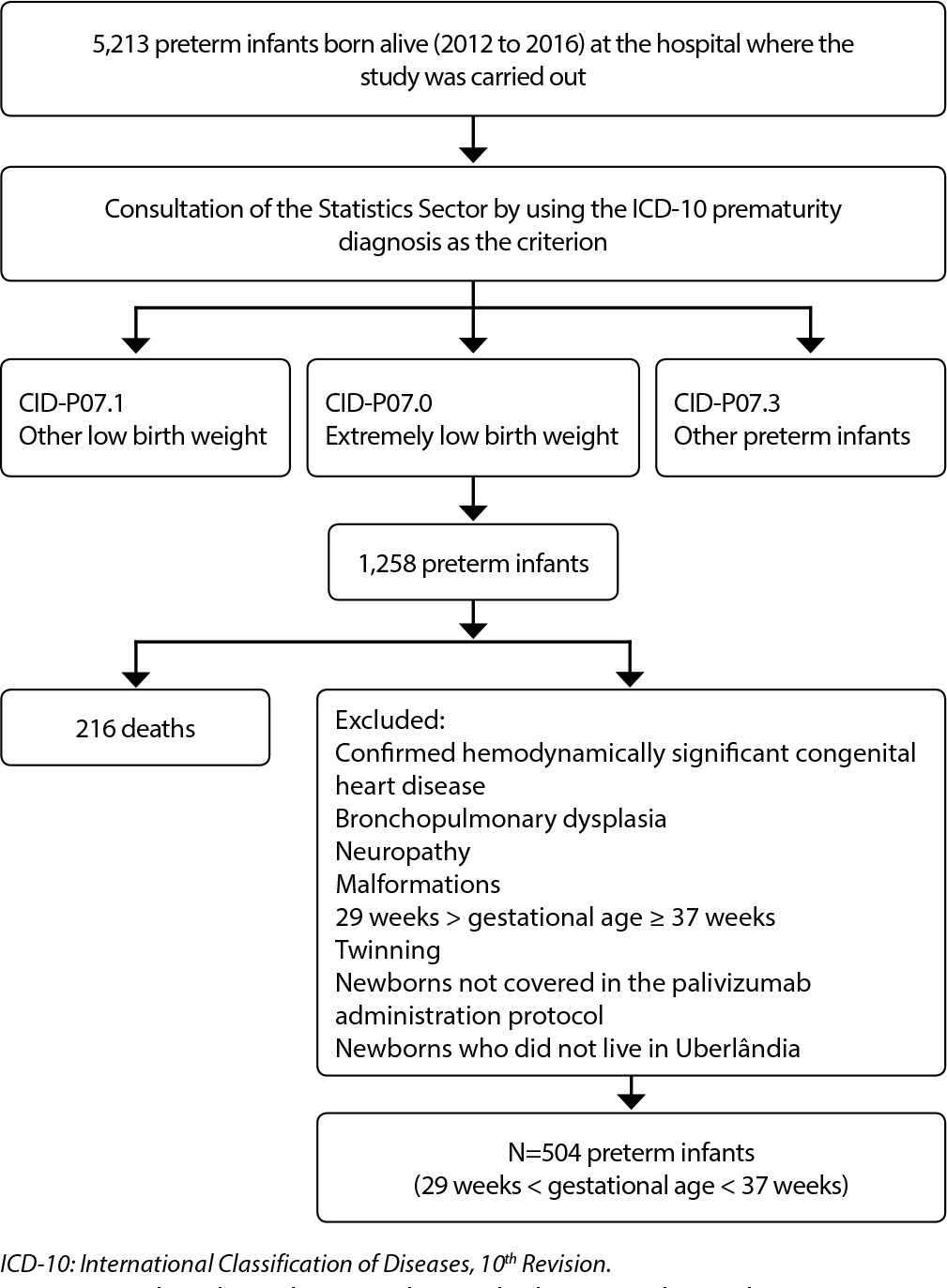
-
ORIGINAL ARTICLE09-09-2022
Palliative care management by caregivers in home care: theoretical validation in a conversation circle
Revista Brasileira de Enfermagem. 2022;75(6):e20210737
Abstract
ORIGINAL ARTICLEPalliative care management by caregivers in home care: theoretical validation in a conversation circle
Revista Brasileira de Enfermagem. 2022;75(6):e20210737
DOI 10.1590/0034-7167-2021-0737
Views0See moreABSTRACT
Objectives:
to present the validation process of a Grounded Theory on the management of palliative care at home by a caregiver of a family member who experiences a death/dying process.
Methods:
a qualitative, explanatory research, which validated a theoretical matrix through a conversation circle containing 15 family caregivers and nine healthcare professionals, in December 2018.
Results:
forty-six propositions were validated regarding family caregivers’ contextual, causal, intervening conditions, consequences and action strategies to deal with the dying and death process of a family member. Conversation circles encouraged dialogue and (re)signification of the senses and knowledge of those involved, proving to be a way of educating and promoting the exercise of citizenship by participants.
Final Considerations:
the conversation circle made it possible for participants to interact and share information and experiences regarding home care for palliative patients and their families.

-
EXPERIENCE REPORT02-25-2022
Production and use of educational technologies in nursing post-graduation
Revista Brasileira de Enfermagem. 2022;75(5):e20210510
Abstract
EXPERIENCE REPORTProduction and use of educational technologies in nursing post-graduation
Revista Brasileira de Enfermagem. 2022;75(5):e20210510
DOI 10.1590/0034-7167-2021-0510
Views0See moreABSTRACT
Objective:
To report, under the light of Gardner’s Theory of Multiple Intelligences, the experience of students with advanced educational practices, involving the production and use of technologies in the postgraduation nursing course of the Universidade Federal de Pernambuco.
Methods:
Experience report of students from the post-graduation nursing program from the Universidade Federal de Pernambuco, about the production of knowledge using educational technology and the application of active methodologies in the teaching-learning process for face-to-face and distance teaching.
Results:
The post-graduate students participated in the educational process in a creative way, both during in-person and distance teaching. They created: domino games, educational videos, parodies, conceptual maps, virtual role-playing, an interactive quiz, among others.
Final considerations:
The experience of the students with the advanced educational practices, including the production and use of technologies in nursing post-graduation showed that the teaching-learning process can be innovative and planned to go beyond traditional methods.
-
ORIGINAL ARTICLE02-17-2020
Professional who attended childbirth and breastfeeding in the first hour of life
Revista Brasileira de Enfermagem. 2020;73(2):e20180448
Abstract
ORIGINAL ARTICLEProfessional who attended childbirth and breastfeeding in the first hour of life
Revista Brasileira de Enfermagem. 2020;73(2):e20180448
DOI 10.1590/0034-7167-2018-0448
Views0See moreABSTRACT
Objectives:
To investigate the association between the professionals who attended vaginal delivery and breastfeeding in the first hour of life.
Methods:
This is a cross-sectional study with data from the Nascer no Brasil (Born in Brazil) survey, conducted in the 2011-2012 period. Data from 8,466 puerperae were analyzed using a logistic regression model with a hierarchical approach.
Results:
The proportion of mothers who breastfed at birth was higher in deliveries attended by nurses (70%). A nurse-assisted delivery was 64% more likely to breastfeed in the first hour of life. Other factors associated with the outcome: residing in the North; age less than 35 years; multiparity; prenatal guidance on breastfeeding in the first hour of life; birth at Baby-Friendly Hospital; companion at birth; and female newborn.
Conclusions:
Obstetrician nurse/nurse-assisted delivery was a significant independent factor associated with breastfeeding in the first hour of life, suggesting the importance of strengthening the role of the obstetrician nurse.
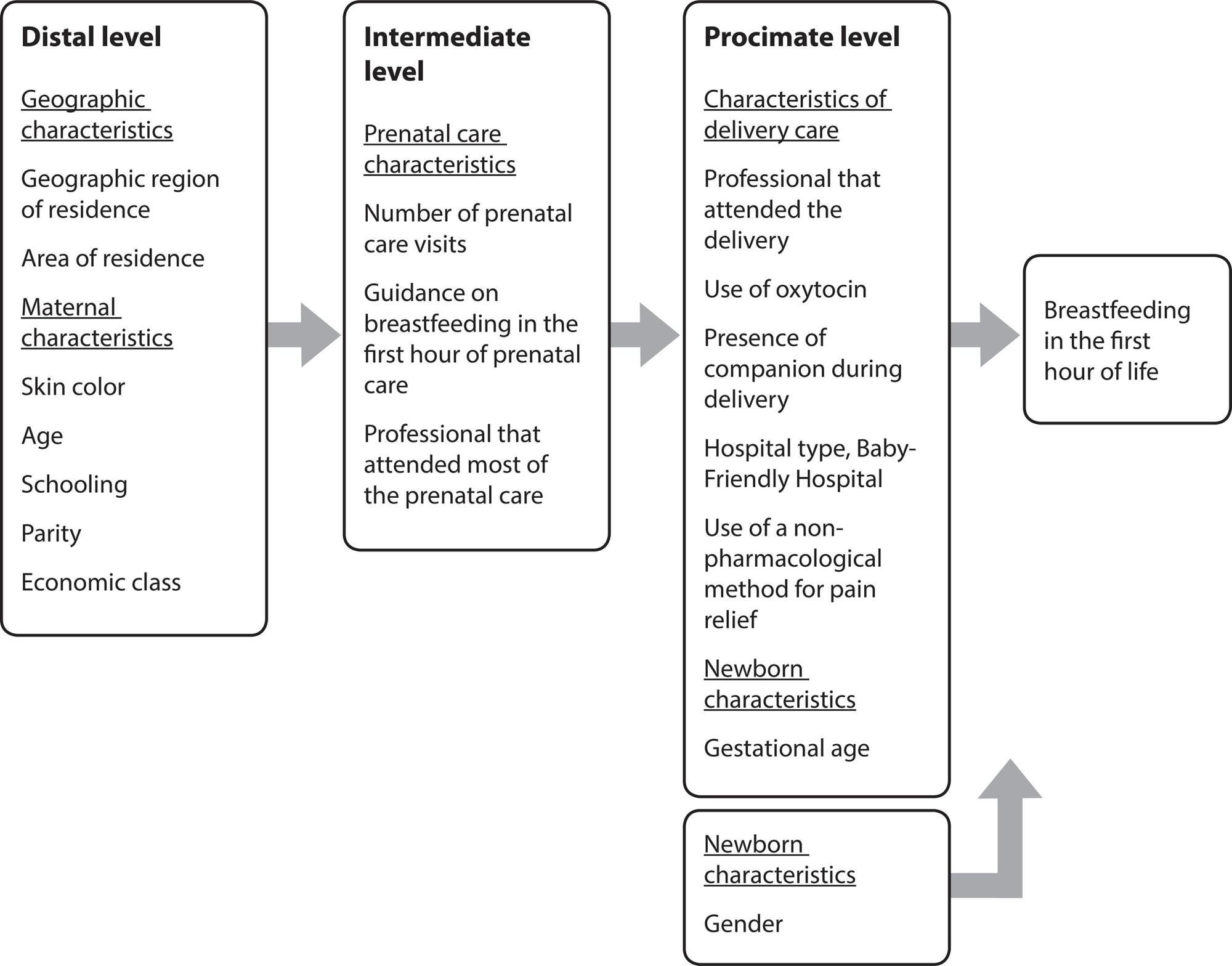
-
ORIGINAL ARTICLE10-25-2022
Prevention of domestic accidents in childhood: knowledge of caregivers at a health care facility
Revista Brasileira de Enfermagem. 2022;75(2):e20210006
Abstract
ORIGINAL ARTICLEPrevention of domestic accidents in childhood: knowledge of caregivers at a health care facility
Revista Brasileira de Enfermagem. 2022;75(2):e20210006
DOI 10.1590/0034-7167-2021-0006
Views0See moreABSTRACT
Objective:
To analyze caregivers’ knowledge about prevention of domestic accidents in early childhood and its association with education level.
Methods:
This is a cross-sectional study conducted in a Primary Care Unit in Niterói with caregivers (convenience sample) of children under 6 years old. To classify the knowledge, we adopted the Positivity Index; to verify the association between the variable “schooling” and knowledge, the chi square test was used; statistically significant results: p < 0.05.
Results:
A total of 256 caregivers participated; 93.5% showed adequate knowledge. In the individual items, the knowledge (100%) about prevention of accidents with sharp toys, firearms, intoxication by products stood out; and less frequently (64.5%), the knowledge of the information contained in the Child’s Health Booklet. There was no statistically significant association (p = 0.237) between education and knowledge. Conclusion: The caregivers presented knowledge about the prevention of domestic accidents, and this was not associated with the level of education.
-
ORIGINAL ARTICLE04-03-2020
Nursing work in assisted human reproduction: between technology and humanization
Revista Brasileira de Enfermagem. 2020;73(3):e20170919
Abstract
ORIGINAL ARTICLENursing work in assisted human reproduction: between technology and humanization
Revista Brasileira de Enfermagem. 2020;73(3):e20170919
DOI 10.1590/0034-7167-2017-0919
Views0See moreABSTRACT
Objectives:
To analyze the social representations of nurses who work with assisted human reproduction about the operation with reproductive biotechnologies.
Methods:
Qualitative approach, supported by the Theory of Social Representations, with sixteen participants. Individual, semi-structured interviews, analyzed through the Alceste software.
Results:
Pragmatic elements related to nurses’ performance from a professional, institutional, and public policy perspective in reproductive biotechnologies emerged, demonstrating the practical dimension of these representations. The characteristics of the professional to act in this area were addressed, showing the lack of information and search for scientificity; precarious perception of the organizational structure of health services; and attributions of nursing care arising from the health care practice in assisted human reproduction.
Final considerations:
Social representation is anchored in the link between technology/medicalization and humanization/reception regarding reproductive biotechnologies. Working in assisted human reproduction involves a new and challenging nursing care, requiring specific and ethical knowledge.
-
ORIGINAL ARTICLE03-20-2020
Cardiometabolic diseases and active aging – polypharmacy in control
Revista Brasileira de Enfermagem. 2020;73(2):e20180324
Abstract
ORIGINAL ARTICLECardiometabolic diseases and active aging – polypharmacy in control
Revista Brasileira de Enfermagem. 2020;73(2):e20180324
DOI 10.1590/0034-7167-2018-0324
Views0See moreABSTRACT
Objectives:
To estimate the prevalence of cardiometabolic diseases and their association with polypharmacy in elderly people at the University of the Third Age (Portuguese acronym: UnATI).
Methods:
A cross-sectional, descriptive, analytical study with 121 elderly patients. The prevalence ratio, Pearson’s Chi-square test and Fisher’s exact test were used as measures of association.
Results:
At the mean age of 68.3, most elderly had at least one cardiometabolic disease (82.6%), of which hypertension was the most prevalent (71.1%), and consumed prescription drugs of continuous use (92.6%). Almost half of the elderly (48.2%) used combinations of drugs, which suggests a high cardiovascular risk. Polypharmacy due to prescription was observed in almost one-third (28.6%) of the sample, associated with the use of antihypertensives (p=0.004), antidiabetics (p=0.000) or lipid-lowering agents (p<0.000).
Conclusions:
Clinical guidelines recommend changes in lifestyle, but increased pharmacotherapy prevails in practice, which increases the risk of adverse events, especially in old age.
-
ORIGINAL ARTICLE03-09-2020
Actions of nurses toward obesity in primary health care units
Revista Brasileira de Enfermagem. 2020;73(2):e20180404
Abstract
ORIGINAL ARTICLEActions of nurses toward obesity in primary health care units
Revista Brasileira de Enfermagem. 2020;73(2):e20180404
DOI 10.1590/0034-7167-2018-0404
Views0See moreABSTRACT
Objectives:
To understand the actions of nurses toward obesity in primary health care units.
Methods:
A phenomenological study was carried out with 12 nurses of a city in the state of Minas Gerais. The interviews were organized into categories and analyzed according to the social phenomenology of Alfred Schütz and literature associated with the theme.
Results:
The following categories emerged, expressing the actions of nurses toward obesity prevention and control: “Guidance on healthy lifestyle habits”, “Barriers to the actions of nurses”, and “Focusing specifically on obesity”.
Final considerations:
Considering that guidance on healthy lifestyle habits was mostly carried out during individual and collective activities directed to the general population, regardless of their weight conditions, nurses must reorganize their professional practice in primary health care units by implementing specific actions for users with obesity or at risk of developing it.
-
ORIGINAL ARTICLE09-29-2022
Incidence of acute radiodermatitis in women with breast cancer undergoing hypofractionated radiotherapy
Revista Brasileira de Enfermagem. 2022;75(1):e20210118
Abstract
ORIGINAL ARTICLEIncidence of acute radiodermatitis in women with breast cancer undergoing hypofractionated radiotherapy
Revista Brasileira de Enfermagem. 2022;75(1):e20210118
DOI 10.1590/0034-7167-2021-0118
Views0See moreABSTRACT
Objective:
To estimate the incidence and degree of acute radiodermatitis at the end and after the end of treatment in women with breast cancer undergoing hypofractionated radiotherapy.
Methods:
Observational, prospective, and longitudinal study, conducted between March 2019 and January 2020, in a radiotherapy outpatient clinic.
Results:
Thirty-two women participated in the study, among whom, in the last session of hypofractionated radiotherapy, 15 (46.9%) had radiodermatitis, erythema in 13 (40.6%), and wet peeling in 2 (6.3%). In the post-treatment evaluation, 27 (84.4%) had radiodermatitis, erythema in 17 (53.1%), dry peeling in 8 (25%), and wet peeling in 2 (6.3%).
Conclusion:
The general incidence of radiodermatitis after hypofractionated radiotherapy in women with breast cancer was 37.5%, erythema, 12.5%, and dry peeling, 25%. The development of care protocols for the management of radiodermatitis after treatment is of paramount importance.
-
REVIEW03-30-2020
Care of the self in the daily living of nurses: an integrative review
Revista Brasileira de Enfermagem. 2020;73(2):e20180668
Abstract
REVIEWCare of the self in the daily living of nurses: an integrative review
Revista Brasileira de Enfermagem. 2020;73(2):e20180668
DOI 10.1590/0034-7167-2018-0668
Views0See moreABSTRACT
Objectives:
to identify if nurses care for themselves and describe such practices.
Methods:
this is an integrative review of the literature published between 2006 and 2018 and indexed in the Literatura Latino-Americana e do Caribe em Ciências da Saúde, Medical Literature Analysis and Retrieval System Online and Web of Science databases.
Results:
the sample totaled 20 articles, grouped by content similarity in the thematic categories “limits and possibilities for the care of the self”, “knowledge about practices on the care of the self” and “implications of care of the self in professional practice”.
Final considerations:
the knowledge about techniques on caring for the self allows nurses to develop themselves personally and professionally. We suggest to managers and administrators a redirection of the nursing practice that contemplates the strengthening of the nurse as the manager of care and leader of the team, as well as the inclusion of the concept of care of the self in the curricula of undergraduate and graduate nursing courses.
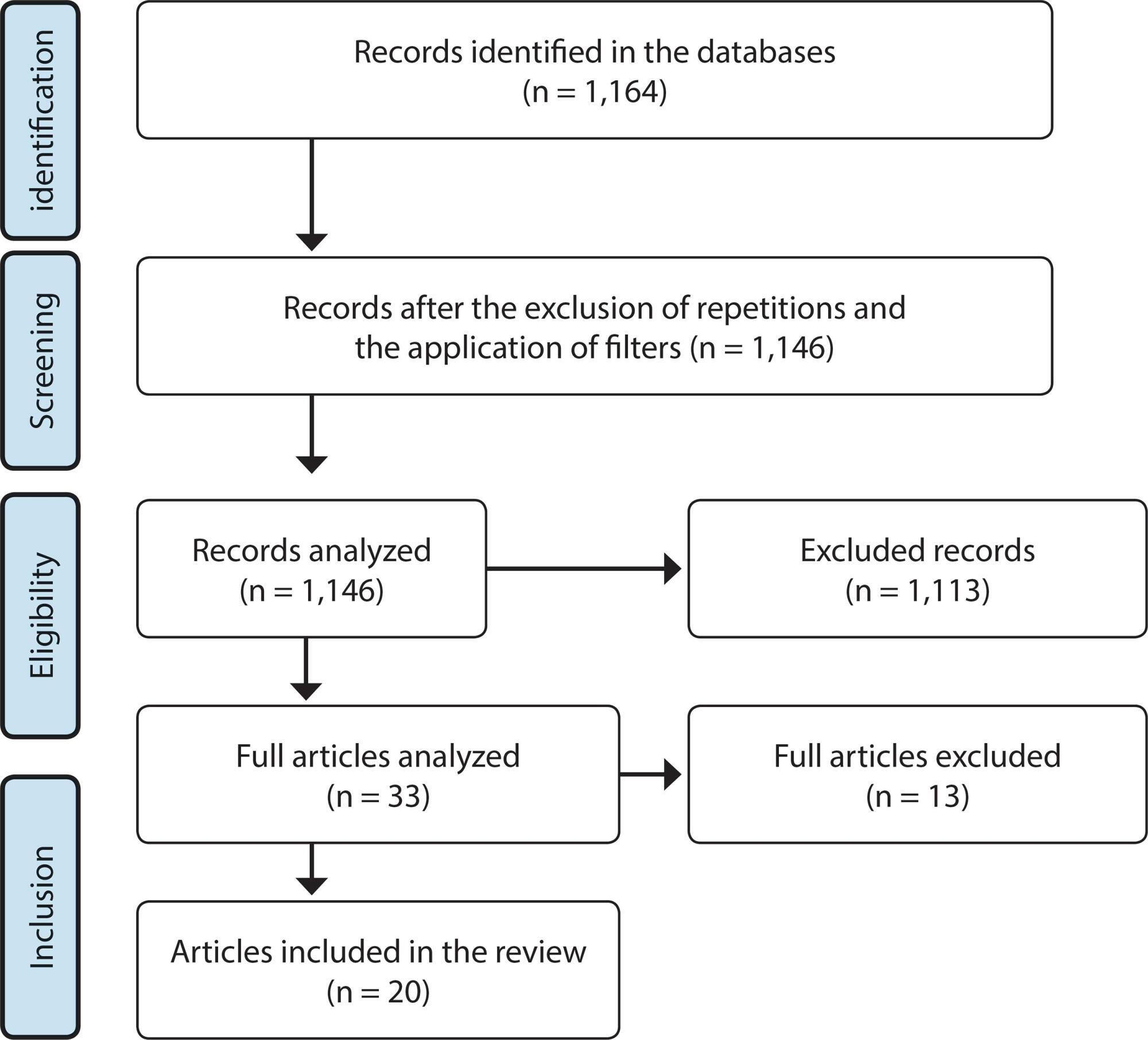
Search
Search in:
Nuvem de Tags
Adolescente (85) Atenção Primária à Saúde (239) COVID-19 (91) Criança (91) Cuidados de Enfermagem (269) Educação em Enfermagem (151) Educação em Saúde (139) Enfermagem (930) Enfermagem Pediátrica (86) Estudantes de Enfermagem (77) Estudos de Validação (131) Família (87) Idoso (208) Promoção da Saúde (99) Qualidade de Vida (104) Saúde do Trabalhador (86) Saúde Mental (145) Saúde Pública (82) Segurança do Paciente (150) Tecnologia Educacional (100)



